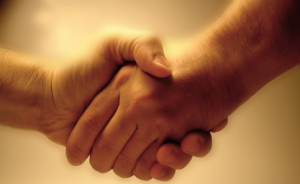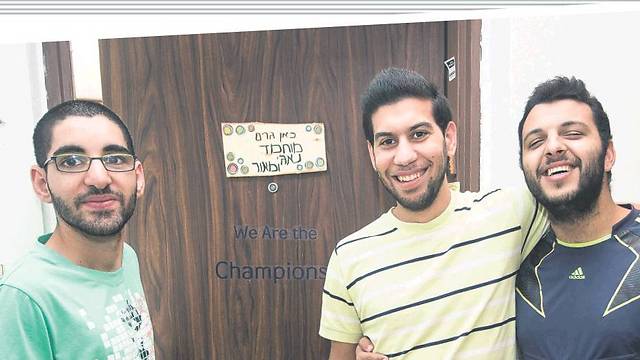
 They are not just refusing to be enemies, the three 20 yr-olds, all of whom are disabled, share an apartment in Israel and have become best friends.
They are not just refusing to be enemies, the three 20 yr-olds, all of whom are disabled, share an apartment in Israel and have become best friends.
By Noam Barkan
They live together in the same apartment, they cook together, do their supermarket shopping together and go out to restaurants together, and won’t let any obstacle stand in their way – not even religion. If we could learn from them how to live together in harmony – an Arab, a Druze and a Jew, all youngsters – we would already have achieved peace.

Naji, Mohammed and Maor live together happily in spite of their different backgrounds. – Photo: Gil Nechushtan
Maor Hazagilov, 22, from Acre, Naji Siyadeh Ahmed, 20, from Majdal Shams and Mohammed Anbusi, 23, from Kafr Jatt, got to know each other while taking part in special needs NGO Kivunim‘s “Wings” youth program, and decided to keep living together.
The three youngsters are charming and their apartment is sparkling clean. Maor gives me a tour of their home, joking: “Mohammed chose the biggest room for himself.”
Do your families have any problem with you living together? A Druze, a Jew and an Arab?
Maor: “No way. Absolutely not.”
Naji: “Right now it’s the season for apples back home. On every trip home to Majdal Shams I make at the weekends, my mum tells me, ‘Take a bag of apples for your friends – eat them together.'”
And is it not ever problematic? For example now, with all the attacks going on?
The three of them shake their heads no. “We don’t talk about politics,” Mohammed says firmly. “Sometimes I watch the news,” Maor says, “but in general politics and I don’t get along.”
Mohammed adds: “When I go home I see the situation with my own eyes. But when I come back here I forget everything. It doesn’t affect me at all and it’s important for us to respect one another. We don’t talk about it. There’s no need. At the end of the day we are all together.”
Naji concurs: “We are all human beings and politics really is not our area.”
Living and having fun together
It’s not immediately apparent, but Maor suffers from impaired vision. He in fact can only see out of one eye and even that is limited. When he finished his studies at a technical school, he joined the youth program of the Kivunim NGO.
He started his national service at a fire station in Acre, as an assistant stockkeeper. “We’re the heart of the station,” Maor smiles proudly.
“National service is one of the organization’s terms of acceptance,” says Or Ben Amram, the trio’s guide. “In their first year they lived together in a kind of commune with their old guides, and in the second year they moved to an apartment in our compound.
“During their national service they start to look to the future. We have a graduate who is already studying for her first degree at Sapir College.”
In the third year, the adult program starts, combining community and employment. “Here in Nahariya we have seven or eight apartments for the adult program, and we could easily have housed Mohammed, Maor and Naji in separate locations. But they asked to live together,” Or continues.
“Maybe in the future they’ll get tired of it,” she says, and the three youngsters burst out laughing. “No way,” says Naji, and his friends nod in agreement. The aim is actually to get each of them to live in their own apartment and learn to manage their own budget and daily life – but in spite of the strong desire for independence, they are having fun together.
Mohammed, who suffers from mild cerebral palsy that affects his right hand and leg, did his national service at the Western Galilee Medical Center in Nahariya.
“I worked in the physiotherapy department and did whatever was needed,” Mohammed says. “Looking after patients, speaking with them, distributing mail, making sure we weren’t missing any stock, checking that the place was in order – I would do all of that.”
Naji smiles. He also did his national service in a hospital. “I worked in the storerooms. During the first year I organized the storeroom, and in the second year I did paper-shredding. I took care of replacing whatever items needed replacing and helped whoever needed help.”
Naji suffers from dystonia, which causes muscle spams throughout his body as well as speech difficulties and impaired vision. “Sometimes people can’t understand me because of my speech, but it doesn’t bother me,” he says.
“I explain the difficulties I have and I know I have nothing to be ashamed of. If I’m a guest at someone’s house and they offer me a drink, I always tell them to give me a half-full glass. Usually people don’t understand and they say, ‘No, take a full glass, don’t be shy,'” Naji says, and his friends laugh.
“So I explain to them that I’m not shy, I’m just asking for a half-full glass because I can’t hold a full glass due to the spasms. Then people say to me, ‘Sorry, I didn’t think of that.'”
Have there been times when your disabilities embarrassed you? For example as a child?
“Kids at school often laughed at me. One day in first grade I came home from school and told my mom: ‘It’s really hard for me. Every day they laugh at me.’
“And my mom replied: ‘Listen. Whoever wants to be your friend, go with them. Whoever laughs at you, just turn your back on them and walk away. Don’t listen to them at all.’ From that day, I started to do as my mother told me: I turned my back, and when kids saw that I didn’t engage when they laughed at me, it stopped being fun for them. They started to be my friends.”
That easily?
“Soemtimes, when I had problems, I was ashamed of myself. But from the moment my mom told me, ‘Don’t be ashamed, it’s from God,’ I kept that sentence in my mind and was no longer ashamed. Everyone has problems. If it’s not a disability then it’s something else, and sometimes my disabilities are easier than the big problems that regular people have.”
Naji smiles, and Or says of him: “Already during Naji’s first year with us he became the prince, because he is just the perfect gentleman. He’s always asking everyone, ‘How are you? How do you feel? Do you need any help?'”
“But only to girls,” Mohammed cuts in with a straight face, and everyone bursts out laughing.
Or continues: “Every year at the end of the summer we hold a closing ceremony. It’s a very big event, with 200 invitees, and everyone spends four months working on the show. I was responsible for what would happen on stage this year. One of the young women was in a wheelchair, and Naji was always making sure that she was getting from place to place, checking if she needed help.
“During one portion of the show she needed to go from one side of the stage to the other, so Mohammed improvised and found a chair, Naji helped her into it – and everyone became simply a family that helped each other. They take care of one another, they know what each one of them needs.”
It sounds ideal.
Naji: “It wasn’t like that at first. It took time to develop.”
The snow that broke the ice
It was, ironically, snow that broke the ice between the three youngsters. A lot of snow.
“During the second year of the program the organization had a project called ‘Giving Week,'” Or explains. “You choose an area of the country and spend a week volunteering in the community. We all went to Jerusalem the week before the big snow storm and helped pack food, volunteered in a home for the elderly, visited the Knesset, and after five days together in the freezing cold of Jerusalem, the group and the guides became really united.”
Then came the yearly trip – three days in the Galilee, Or says. “I worked with them last year and did a class with them. It was very difficult for me to part from them, so I became a guide in the adult program. I am responsible for their apartment, I come to check if they’re cooking properly, and if it’s good I’ll give it a taste,” she laughs.
“If there’s any kind of disagreement between them then we’ll all have a discussion.”
Who’s the master chef?
Or: “Mohammed is the cook, but the three of them often cook together.”
Naji: “We help each other with everything. We do the shopping together, clear the table together, clean together. We do all of it together – and if one of us is tired and wants to rest, we understand.”
Up until now, when they’ve gone out shopping together, they’ve bought from the cafe and the supermarket at the organization, which takes care of the payment. Starting from next month the three will take another step towards independence: they will pay their own way, using the money they will earn from working.
They’re not worried. Naji and Mohammed have job interviews this week and in the meantime, Naji works in maintenance and Mohammed in the organization’s shop in Acre. “We sell items that have been handmade by people with disabilities,” Mohammed says.
Together, he and his friends look and sound like the furthest thing you can imagine from being disabled.
View original Ynet publication at:
http://www.ynetnews.com/articles/0,7340,L-4725762,00.html






 Israeli New Shekel Exchange Rate
Israeli New Shekel Exchange Rate